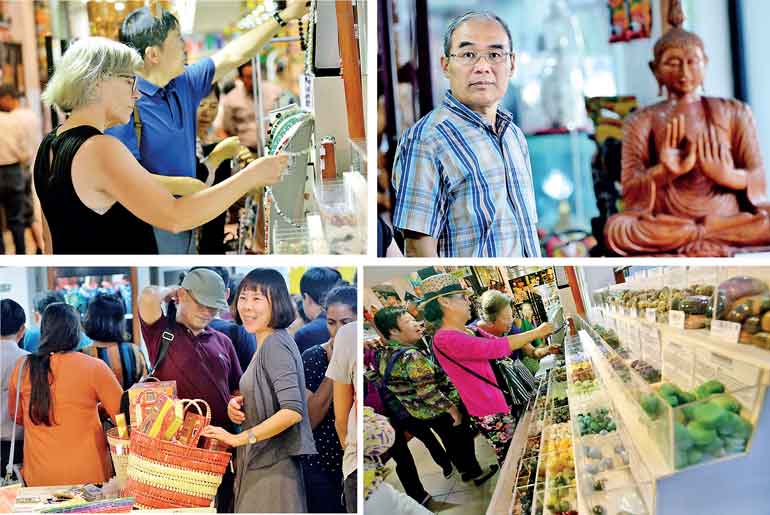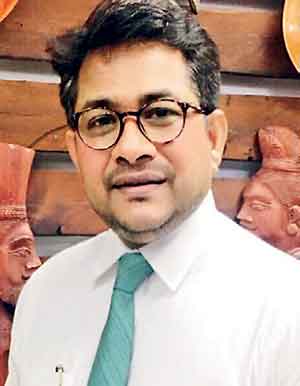Thursday Feb 19, 2026
Thursday Feb 19, 2026
Thursday, 23 November 2017 00:00 - - {{hitsCtrl.values.hits}}

Laksala is Sri Lanka’s largest and only State-owned gift, souvenir and handicraft shop and operates with the sole aim of promoting the talent of local handicrafts and artisans. In this interview with Daily FT, Laksala CEO Ali Ahlam Nawaz outlines the objectives of the company and speaks on the need for the corporate sector to place purchases of promotional gifts through Laksala, in order to strengthen the country’s handicraft sector and uplift local artisans. Following are excerpts:
By Shannon Jayawardena
Q: As the CEO of Laksala, what is your main focus and how do you plan to develop the company from where it is at present?
A: As the CEO, my main focus is to market Sri Lankan handicraft products in the international market. Right now we’re doing so by selling mostly to tourists who visit Sri Lanka. For long-term sustainability, we’re mostly dependent on the arrival of tourists because they admire the products. Therefore we are confident in marketing to them. We also plan to attract local buyers, which will further help develop the sector. It is my duty to boost local handicrafts by bringing rural craftsmen into the mainstream and boosting the value of the product in the local market.
Q: Laksala has over 12,000 products that promote the country’s historic arts and crafts legacy. What is your role in the development of the country’s handicraft sector?
A: Yes, we have over 12,000 products and out of that around 1,500 products have been categorised as fast-moving products and have great business. Areas we need to improve on are designing, pricing and packaging. Our role is to further develop the quality of the products to ensure authenticity and attract more customers. This will also make people value the craftsmanship of the country.
Q: Encouraging local corporate sectors to place their gifts through Laksala will not only contribute to your company but to the handicraft sector of the country as a whole. How do you plan on incorporating this?
A: Yes, in my opinion this is the important thing that needs to be addressed. We are a Sri Lankan Handicraft Board, so like I said our main focus is to develop the handicraft sector bringing local artisans who live in villages to the mainstream exports, in other words to give them the identity to market through Laksala. Sri Lankan business corporate sectors mainly rely on getting their corporate gifts from countries out of Sri Lanka such as China, Bangladesh, Vietnam and Cambodia.
For example, if we take banks and the financial industries, they have a vast number of customers and have annual or promotional campaign gifts which are mostly imported. So my request to the Sri Lankan corporate sector is to help the handicraft sector of the country through Laksala. We are the mediators and can meet their requirements. Instead of giving a clock or umbrella, give an oil lamp or something that is made in Sri Lanka. Placing orders in the handicraft sector creates more jobs for local craftsmen. The money is then kept in the country and goes towards the development of the sector.
Q: How do you plan on expanding in keeping with the vision to uplift traditional skills in rural areas?
A: Our plan is to come into the local sector. The money is going out of the country for corporate gifts but we aim on bringing that money to the handicraft sector of Sri Lanka. This will give people high quality Sri Lankan handicraft products and sustain industries. It is only if we sustain the industry that Laksala can strive. We are connected with two other bodies, a National Crafts Council that develops the sector by giving the right skills to the people, and the National Design Centre, which trains people with world class design. There are around 200 training centres islandwide that go in search of talented handicrafts to train and develop their skills.
Q: What is your approach to motivating and developing local talent?
A: To motivate and develop local talent we must create more orders for local handicrafts. When we place an advance for their orders and once the product has been delivered in the local markets, they are motivated. I was in New York last year and one of the top class CEOs had on his table a handicraft elephant. A product made by a very simple artisan has now been placed on a high class CEO’s desk. So imagine the motivation we can create. Every artisan’s motivator is ultimate appreciation for their products. We also have Annual Presidential Awards to motivate them even more.
Q: Sri Lanka is focusing highly on the tourism sector. How do you capture the interest of tourists who contribute greatly towards the increase of sales?
A: Nowadays tourists who come in are mostly budget tourists. An average tourist spends nearly $ 250 a day, so we would like to see an increase in tourist expenditure. The tourism sector should work to attract more tourists to the country who looks for both qualitative and quantitative products.
Q: What is the sales percentage breakdown in terms of locals and foreigners?
A: A total of 80-85% is sold to foreigners and I would say around 15% to locals. Lmostly buy our handloom products such as batik sarees and bedsheets. Everything in Laksala is Sri Lankan made so we need to encourage more local customers to purchase products.
Q: What do you think are the company’s biggest challenges and how is the company looking to evolve so that it continues to compete effectively?
A: There are a few challenges that our company is facing. Number one is to sustain the sector by giving them more jobs, to create more work in the handicraft sector. We don’t want the artisans to move on to different industries due to the unavailability of jobs. Craftsmen are relying only on tourism and we need to develop a different channel of business for them.
Secondly, we need to create job stability, revenue and income to improve the living standards of the craftsmen. Thirdly, we need to develop their quality more. Therefore it our responsibility to identify world-class design. The company evolves the moment our sales increase, as it helps the sector more. Laksala is purely for Sri Lankan handicrafts so our commitment in order to increase sales is to develop the local artisans.
Q: How is Laksala gearing to take advantage of new technology and social media?
A: Today social media is very important so we are currently working on social media and digital marketing campaigns. We’ve just signed up with a few companies which can help us and promote us in order to take Laksala to a global platform. We are seriously working towards customers being able to purchase our products online even without coming to Sri Lanka. Many youngsters have come in to volunteer to promote and market our company which is a national product. By next year January or February we will be opening doors to effective digital marketing.
Q: The festive season is just around the corner, which means more tourists and more sales. How do you plan on enhancing product visibility during the upcoming festive season?
A: Every season we offer something that is more attractive and we work with local teams. This season we are going with the clothing line, so special discounts will be offered on all Laksala garments. Discounts up to 70% will be accessible on some of our products in order to create a celebrative feel and to enable all customers to enjoy the season with our local products.
Q: What do you hope to accomplish in the upcoming years?
A: The years ahead are a big challenge for us and in order to sustain the industry we would like to increase our sales, which is with the expectation of more tourist arrivals and encouraging local corporate sectors to help the handicraft industry by placing their orders with us. In 2018 we hope that all corporate sectors will join hands with Laksala and get their gifts through us to create confidence in the handicraft sector of the country.
Pix by Shehan Gunasekara